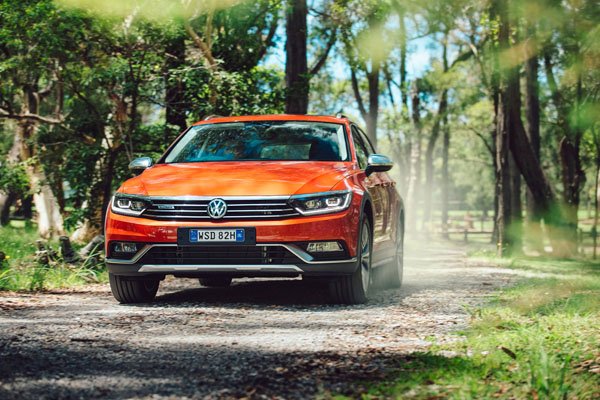
Volkswagen has added an All-Wheel Drive variant to its flagship Passat model range. Called the Passat Alltrack it joins the eighth-generation sedan and wagons that were launched here in October 2015.
A wagon/SUV crossover Alltrack is based on the Passat wagon but is bolstered by 27.5 mm of extra ground clearance, plastic-cladded wheel arch mouldings, flared side sills and underbody protection. Other external cues include distinctive bumpers and 18-inch “Kalamata” alloy wheels.
The interior of the Passat Alltrack is stylish and elegant with Vienna leather-trimmed upholstery, leather-wrapped multi-function steering wheel and gearshift knob and LED reading lights. The slimline dashboard adds a real touch of class.
The seats are comfortable and front headroom is reasonable even where the optional sunroof is fitted. There’s a surprising amount of rear seat legroom and 639 litres of rear storage space extendable to 1769 litres with the back seats folded. The cargo area is 1172 mm in length extending to 2018 mm with the rear seatbacks down. The boot also comes with a luggage partition net; two-part secuy blind; shopping bag hooks; load restraint hooks; interior illumination and a 12-volt socket.
In a sign of Volkswagen Australia’s confidence that the emissions problem is behind them the only engine on offer is a new 2.0-litre turbo-diesel which replaces the offending EA189 diesel of the same capacity as used in the previous Alltrack.
Both power and torque have increased to 140kW (from 130 kW) and 400 Nm (from 380 Nm) with peaks of 3400 rpm and 1750 rpm respectively. Transmission is a six-speed DSG dual-clutch automatic, disappointingly without paddle shifters.
Fuel consumption is down from 6.3 to 5.4 litres per 100 kilometres courtesy of VW’s BlueMotion technology which incorporates efficiency features such as engine start/stop and brake energy recuperation and a coasting function. Emissions are steady at 166 grams per km although that comparison must be questionable.
At $49,290 plus on-road costs new Passat Alltrack is $1000 dearer than the outgoing model but that price increase is more than offset by additional features.
Safety equipment includes statutory requirements such as stability/traction control and ABS brakes as well as nine airbags; reversing camera; front and rear parking sensors; rear traffic alert; fatigue detection; blind spot monitoring; emergency braking; and forward collision warning.
Wheels and tyres get the ‘belts and braces’ treatment with tyre pressure monitoring; a full-sized spare and Continental’s new ‘ContiSeal’ tyres which automatically seal punctures of up to 5 mm. According to VW the latter account for around 85 per cent of flat tyres.
For those who want even more there’s a $3500 Luxury Pack that adds a chrome grille strip; LED daytime running lights; LED headlights with a cornering function; headlight washers; panoramic sunroof; ambient interior lighting; powered side mirrors and Park Assist.
In addition to the driving profiles featured in the standard Passat (Eco, Normal, Sport and Individual) Alltrack also gets an Off-Road mode which adjusts the traction and stability control systems, suspension settings and transmission to adapt to rougher surfaces. It also activates the hill descent control feature.
Towing capacity is up from 1800 kg to an impressive 2200 kg.
Although Passat Alltrack uses Volkswagen’s latest 4MOTION all-wheel drive system its default driving mode is through the front wheels with the rears being engaged when a potential loss of traction is detected.
The infotainment system uses the Discovery Pro multimedia unit displayed on an 8-inch high-definition screen. It uses the App-Connect system as an interface with both Apple and Android smartphones as well as USB, SD and AUX inputs and a 10 Gb hard drive. Satellite navigation is standard.
We were able to road test new Passat Alltrack on a variety of conditions between Bathurst and the spectacular Wolgan Valley and then back to Sydney. The outward route included an extended segment of relatively smooth gravel with the occasional more rugged stretch, all of which the Alltrack coped with in comfort.
The return leg crossed the Blue Mountains via the Bells Line Of Road, formerly one of the best drives on the fringes of Sydney but now stifled by low speed limits, before the motorway run to the airport.
There is a fair bit of turbo lag but once that’s passed the big torque shuffles the Alltrack along very nicely especially when it’s in Sport mode.
On that return leg we logged fuel usage at 7.9 litres per 100 km, well above the claimed 5.4 L/100 km. We’ll check that again when we take the Passat Alltrack for our usual extended road test.
While the SUV craze shows no sign of abating there’s also a trend back towards station wagons which can match the functional benefits of an SUV while providing a more driveable, comfortable and economical environment. Subaru Outback pioneered, and has long dominated, this category but Volkswagen Passat Alltrack looks like it will become a serious alternative.